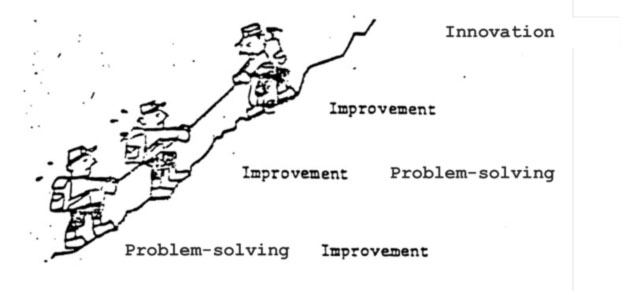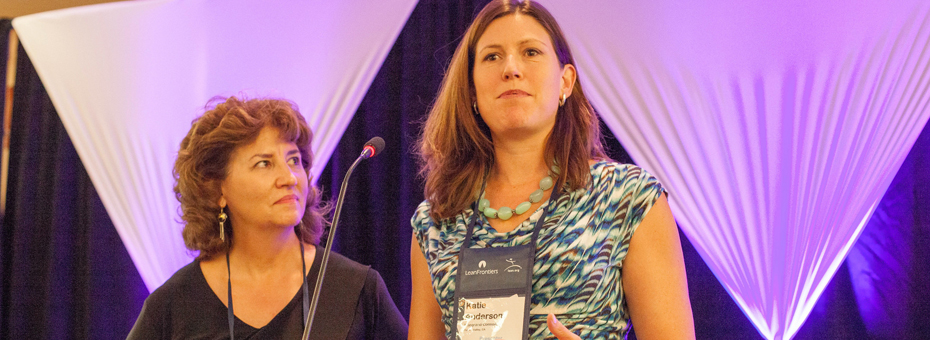Photo by Garret Hoover
At the 3rd Annual Lean Coaching Summit in Long Beach two weeks ago, more than 200 Lean practitioners gathered to share and learn about lean coaching as a theory and a practice.
In his closing keynote, John Shook proposed that:
- The key to successful lean transformation is capability building.
- The core capability for building capabilities in organizations is coaching.
He also said that Lean is both personal and organizational. Our broader goal in a lean transformation is to see a shift in the entire organization where everyone is a problem solver, but to do so requires each of us to personally change and continuously improve. If this is true, then as coaches and leaders, we need to keep an intentional focus on how we are developing as coaches.
Listening to one of John Shook’s first coaches, Professor Isao Yoshino, illuminated this point. This was the highlight of the Summit for me – the opportunity to hear a personal coaching story from John Shook and his “Sanderson.” (Yoshino is one of the two Japanese senseis who served as the basis for the coaching relationship Shook describes through his book, Managing to Learn).
Yoshino said he had two intentional goals when coaching John at Toyota and during the NUMMI years. His first goal was to develop John by giving him a mission or target and supporting him while John figured out how to reach the target. His second goal was to develop himself as a coach as he was coaching John. He knew John’s learning depended on the strength of his coaching.
How do we develop as coaches WHILE we are developing others? We might reword the description of lean leadership this way: A lean leader’s job is to develop people as you get the job done AND concurrently develop yourself so that you can better develop others.

One way to develop yourself as a coach is through intentional practice.
At the Summit, Margie Hagene and I led a learning session focused on the story of our coaching relationship and how to develop one’s own coaching skills through A3 thinking. We shared a framework for lean coaching intentions, behaviors, and tools.
Elements of the framework include:
- Practice being “a little bit better every day.”
- Build in time and support the creation of conditions for repeatable and intentional practice.
- Learn by doing – you are a more effective coach when you have struggled with your own change.
- Practice PDCA on yourself.
Developing a personal improvement A3 is one tool you can use to help you identify what gaps you need to close in yourself to better be able to coach while developing others.
I use the A3 thinking process to help clients articulate specific skills they want to work on and then to develop a plan for their own improvement. When I worked as the lean leader responsible for supporting the transformation at a large healthcare system, I used A3s frequently in my conversations with staff. I found that the A3 thinking process, including playing catchball as they worked to develop their own A3s, gave us a structured way to better understand and plan for their development needs. The process also helped staff become owners of their development plans and increased my clarity of how I, and others, could better support team members.
It’s not easy to develop a personal A3, but the deep thinking and reflection it requires has focused and accelerated my own development as a coach. In so doing, it has enabled me to more effectively help others identify how they can improve as lean leaders and practitioners.
Elements of a Personal improvement A3:
- BACKGROUND: Why should I improve myself as a coach/leader who creates an organization filled with problem solvers? Why this? Why now?
- CURRENT CONDITION: What are habits/actions I currently take (strengths and limitations)? What are the outcomes from these habits/actions?
- PROBLEM STATEMENT: (one concise sentence)
- GOALS/TARGETS: What is the new desired condition? What does good look like? How much? By when?
- ANALYSIS: What are the reasons for my current performance (strong habits and limiting habits)? Why is there a gap?
- PROPOSED COUNTERMEASURES: What experiments will I try on myself to become a better coach/leader of problem solvers?
- PLAN: What next steps will I take and when? What is my practice plan to develop new habits and close the gap?
- FOLLOW UP: How will I know there is improvement? How will I know if I’m off plan? How will I make time to practice? What is my process for ongoing reflection and PDCA? Whom else will I involve?
What are you doing as a coach to intentionally build your coaching capabilities so that you can build capability and support a successful lean transformation in your organization?






